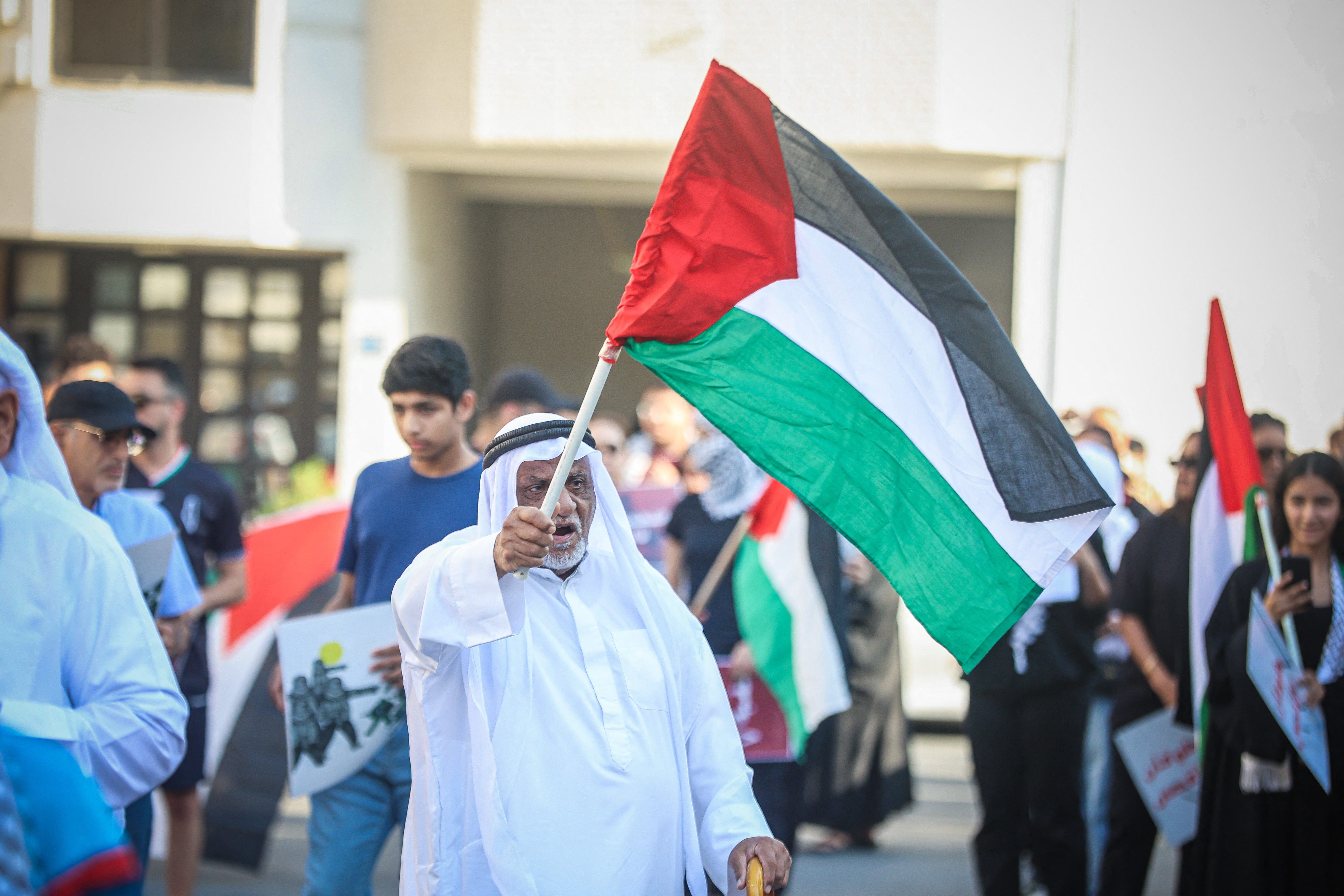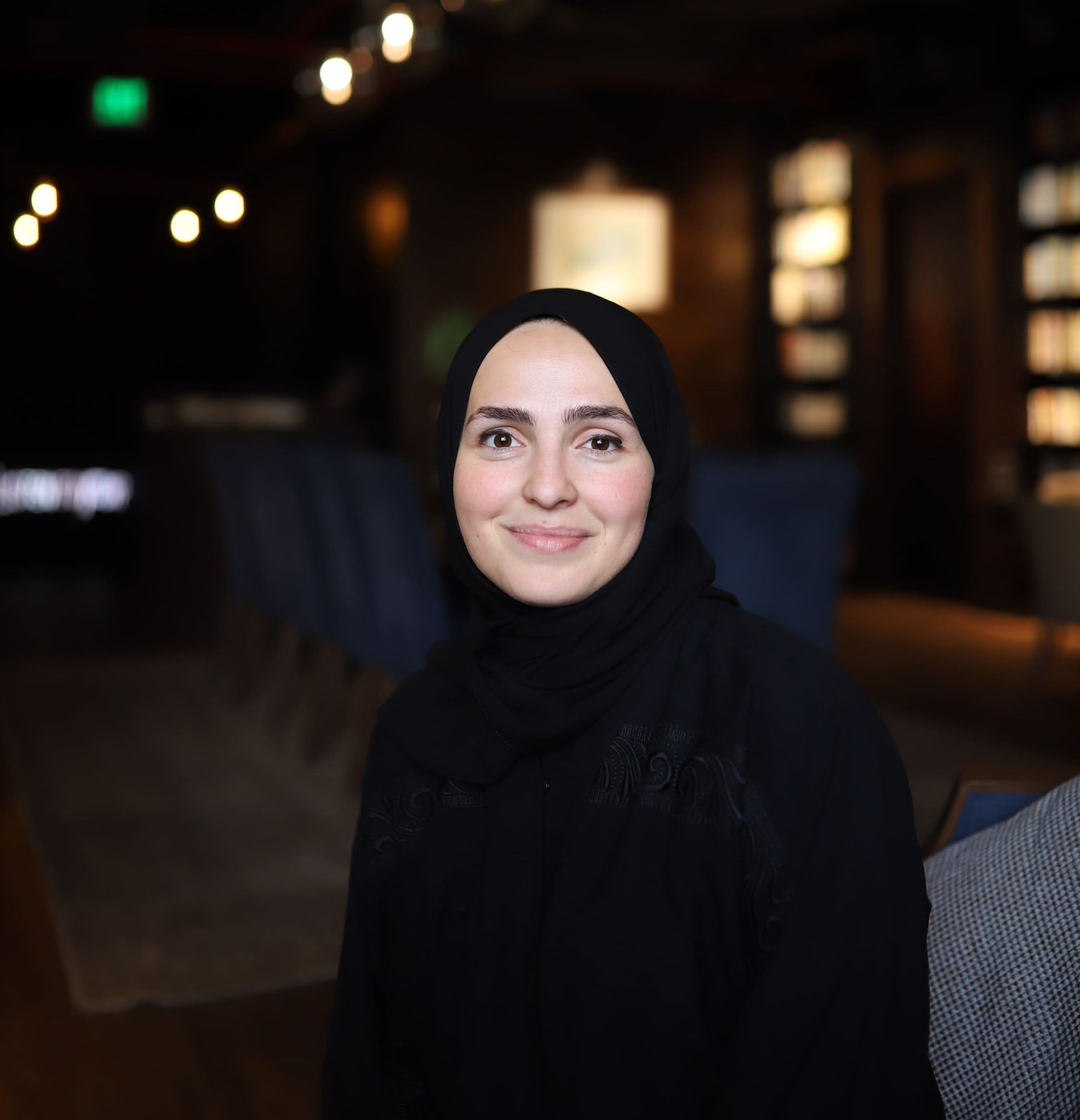Since an unprecedented conflict flared between Israel and Hamas on October 7, the Arab Gulf states have been working to de-escalate and prevent the crisis from sparking a catastrophic regional war dragging in Iranian allies such as Hezbollah in Lebanon, armed groups in Syria and Houthi rebels in Yemen.
Yet while the GCC states agree on the need for an immediate ceasefire and humanitarian access into Gaza, their individual responses to the crisis have markedly differed. Some have maintained their traditional posture of supporting Palestinian rights and calling for a two-state solution. But those who normalized relations with Israel during the administration of U.S. former president Donald Trump find themselves in an uncomfortable position as Israel pummels the crowded territory and protestors throng the streets across the Arab and Muslim worlds.
A Sensitive Balancing Act
The United Arab Emirates (UAE) and Bahrain, which signed the Abraham Accords to normalize relations with Israel in 2020, have cautiously balanced their ties with Israel and the United States against strong pro-Palestinian sentiments among both their citizens and expat populations. The October 17 explosion at the Al-Ahli Baptist hospital in the Gaza Strip, which killed hundreds of Palestinians and wounded hundreds more, forced Abu Dhabi and Manama to adopt a more forceful rhetoric, blaming and “strongly condemning” Israel. Nevertheless, while aligning themselves with their GCC partners, they did not go as far as fundamentally testing their relationships with Israel. This subtle shift in tone may be related to pressure from public opinion over a conflict that has already left thousands of Palestinian civilians dead.
The other GCC members have been sharper in their condemnation of Israel and its longstanding policies that led to the recent crisis. Qatar, for example, has placed sole blame on Israel for the escalation of violence and for the hospital blast, calling it a “brutal massacre and heinous crime.” Yet Qatar has also played a longstanding role as a go-between Israel and Hamas and has already been instrumental in negotiating the release of two U.S. citizens held by Hamas on October 20.
Saudi Arabia, for its part, has called for an immediate ceasefire and reactivation of the international Quartet on the Middle East to revive regional peace efforts. Under de facto Saudi leadership, the Organization of Islamic Cooperation (OIC) held an urgent meeting to establish a unified stance against the Israeli aggression. This meeting was notable as it was attended by Iran’s foreign minister Hossein Amir-Abdollahian, who also met his Saudi counterpart for a bilateral discussion, seven months after the two regional heavyweights signed a de-escalation deal to end years of tensions.
These meetings were part of an intense flurry of diplomatic efforts by GCC actors, particularly Riyadh and Doha. Gulf officials are deeply concerned about the conflict dragging in Iranian allies such as Lebanon’s Hezbollah and causing further escalation across the region. Saudi Crown Prince Mohammed bin Salman and Iranian President Ebrahim Raisi discussed the crisis in their first phone call since their rapprochement in March.
Saudi Arabia’s relationship with Israel differs significantly from those of other Gulf countries. Its role as custodian of the two holiest sites in Islam puts its leadership in an extremely delicate situation when it comes to relations with Israel, especially during a crisis partly sparked by Israeli provocations at a third, Jerusalem’s Al-Aqsa Mosque. For Israel, normalization with Saudi Arabia would be a far bigger prize than with UAE or the other GCC states, due precisely to the kingdom’s religious significance, as well as its economic and political clout. If Saudi Arabia were to normalize, other majority-Muslim nations like Indonesia and Malaysia could even follow suit. Just weeks before the October conflict, Saudi Crown Prince Mohammed bin Salman told Fox News that “every day, we get closer” to normalization, while adding that the deal must ease the lives of Palestinians. The violence in Gaza has likely put that process on ice indefinitely.
Perhaps the GCC state most diplomatically engaged in the Gaza crisis has been Qatar. Not only has it vocally opposed Israel’s forcible displacement of Palestinians through indiscriminate bombing and collective punishment, but it has also engaged in shuttle diplomacy to push for an immediate ceasefire and aid deliveries into the besieged territory. Foreign Minister Sheikh Mohammed Al-Thani said Qatar defended the decision to keep the Hamas office in Doha open in order to maintain channels of communication and potentially mediate a ceasefire or prisoner exchange. The Emir’s highly influential mother, Sheikha Moza bint Nasser, has shared photos of the destruction in Gaza on social media, including a destroyed education center that Qatar helped establish.
At the other end of the GCC spectrum, the relatively neutral stances of the UAE and Bahrain reflect considerations around their normalization of relations with Israel. The UAE initially called for de-escalation without even mentioning Israel’s occupation. However, as the bombardment of Gaza escalated, the UAE’s discourse shifted to focus on the humanitarian crisis in the territory, announcing $20 million in humanitarian aid.
The UAE’s permanent representative to the United Nations, Lana Nusseibeh, highlighted the devastating conditions facing civilians in Gaza, adding that, “Hamas does not represent the Palestinian people or the people of Gaza,” while the Emirati foreign ministry said it was “appalled” at the abduction of Israeli citizens. Reports have appeared on social media that U.S. military aircraft had arrived in the UAE to support Israel, but the UAE Ministry of Defense denied these claims, saying the arrivals of U.S. aircraft at the Al-Dhafra base were scheduled months in advance.
Protests and Donations
It is likely that the UAE and Bahrain will continue to try and distance themselves from the conflict, emphasizing the humanitarian crisis without pointing fingers at any party. However, as the violence escalates, meeting the delicate balance of upholding commitments with Israel while not openly opposing public sentiment will become increasingly difficult. Even though these countries lack a robust civil society that could influence their foreign policies, their leaderships will strive to avoid provoking public anger both domestically and in the wider region. It is worth noting that in Bahrain, demonstrators have staged angry protests not only against the conflict in Gaza but also against normalization with Israel.
Similar rallies have not been reported in Saudi Arabia. However, the imam at the grand mosque in Mecca, Islam’s holiest site, delivered an overtly political sermon on October 13, almost certainly approved ahead of time by the authorities. “God, be for the Muslims in Palestine a supporter, helper and defender,” he said. “Have mercy on their dead and give them the rewards of martyrdom.” By contrast, in the UAE, the televised Friday sermon did not mention the Palestinians at all. A scheduled solidarity event in Dubai, “Run for Palestine,” was reportedly “postponed” with no reason given.
In Kuwait and Qatar, protests have been more active. Thousands of citizens and residents gathered on October 13 to protest Israel and show solidarity with Palestinians. Kuwait, despite expelling part of its Palestinian population the 1990s over PLO Chairman Yasser Arafat’s support of Iraqi dictator Saddam Hussein’s invasion, has vigorously defended the Palestinian cause and underlined that the country will be the last in the region to normalize with Israel. Kuwait’s more pluralist political life has helped shape its policy.
Omanis, including their Grand Mufti Ahmed bin Hamad Al-Khalili, have also protested against the Israeli assault on Gaza and condemned the Arab world’s inability to stop it. Oman, the current chair of the GCC, views the escalation as a consequence of Israel’s illegal occupation and “constant Israeli aggressions in Palestinian cities and villages”.
Alongside their diplomatic efforts, the GCC states have also rapidly amassed donations for aid to Gaza, even as the Rafah border crossing from Egypt stayed shut. At a meeting on October 17, GCC ministers declared $100 million in contributions. The Gulf publics have also reached deep into their pockets. Two dozen Kuwaiti non-profits collected $10 million in donations, while the UAE launched a campaign to provide money for reconstruction and other aid to Emirates Red Crescent. Qatar’s Red Crescent Society, which operates inside Gaza, has provided medical aid.
The Gulf Arab states are likely to continue showing solidarity with the Palestinian people and publicly criticizing Israel’s operations against Gaza. They will likely also refrain from communicating directly with Israel, at least in public, in order to avoid anger from the street. They may choose to communicate via go-betweens, particularly the U.S., but can also be expected to step up their diplomacy to push for an end to the conflict. The questions that remain are whether any Gulf state can play a significant role pushing Israel towards a ceasefire or become a primary peace broker and be able to determine the region’s dynamics once the dust has settled in Gaza.


